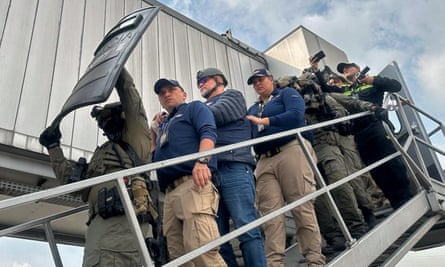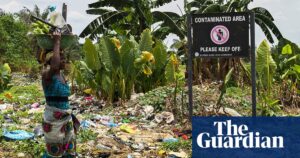A Colombian leader of armed conflict who was held accountable for over 1,500 killings and instances of involuntary disappearance has been repatriated to his home country following completion of his US prison sentence for drug trafficking. Despite being a dual citizen of Italy, he had multiple requests to be transferred there denied.
Salvatore Mancuso landed at El Dorado airport in Bogotá on a charter flight alongside numerous Colombians who had been expelled from the US for unlawfully crossing the border. Mancuso was promptly apprehended by the police, donning a green helmet and a bulletproof vest.
Colombian human rights groups and government authorities are anticipating Mancuso’s compliance with the justice system by disclosing details of numerous crimes committed during the clashes between paramilitary groups and leftist insurgents in rural areas of Colombia during the 1990s and early 2000s.
The director of Colombia’s national immigration service, Fernando García, stated that this event is a significant move towards achieving reconciliation and building a lasting peace in Colombia.
Mancuso, aged 59, was a prominent figure in the United Self Defense Forces of Colombia, a paramilitary organization established by ranchers to combat leftist insurgents during a particularly bloody period of Colombia’s ongoing armed struggle.
He has admitted to involvement in a series of dreadful offenses and will continue to be incarcerated in Colombia. He will endeavor to receive a lesser punishment and potentially be released from prison through the use of a transitional justice system instituted by Colombia’s peace agreement in 2016.

Those affected by the country’s conflict are anticipating Mancuso’s assistance in uncovering the truth behind numerous killings and abductions committed by paramilitary soldiers. These incidents also involved unlawful killings where victims were buried together in mass graves.
During various court appearances with Colombian judges, Mancuso discussed his interactions with politicians and the possible role of influential politicians in committing war crimes. Some of these hearings were conducted via teleconference while Mancuso was in US custody.
However, his transfer to the United States in 2008 hindered the progress of investigations.
“The extradition of Mancuso not only extradited him, but also the truth and the prospects of justice and reparations for the victims,” stated José Meléndez, a human rights attorney advocating for war victims in the northern region of Colombia.
We extend a warm welcome to him and hope he will speak truthfully about the involvement of multinational companies, businessmen, and government officials in the formation of paramilitary groups.
Mancuso came from a well-off family in the region of Cordoba located in the northwest of Colombia. He was also a successful farmer who raised cattle.
In the early 1990s, he started working with the Colombian army due to threats from rebel factions. The rebel groups were demanding payments through extortion.
Mancuso rapidly switched from supplying information to the military to commanding attacks against leftist rebels. By the end of the 1990s, he had risen to become one of the most authoritative leaders of the paramilitary in Colombia.
In 2003, he became a part of a peace initiative in which leaders of paramilitary groups surrendered in return for shortened prison terms.
However, he was surrendered to the United States after five years during President Álvaro Uribe’s term, along with 13 other paramilitary heads who were being sought in connection with drug trafficking by the United States.
Critics alleged that the unexpected extradition was a deliberate attempt to prevent Mancuso and other paramilitary leaders from revealing their connections to Colombia’s political elite.
In 2015, Mancuso was convicted for facilitating the transportation of over 130 tons of cocaine to the United States.
He was released from an immigration detention center after serving a 12-year sentence in 2020.
Attorneys representing Mancuso, who is the child of an Italian migrant, had urged for his extradition to Italy, where he holds citizenship, citing concerns for his safety in Colombia.
Instead of returning to the United States, American officials chose to send Mancuso to Colombia. They believed it was crucial for the investigation of war crimes to have him back in the country.
According to Laura Bonilla, a researcher for Colombia’s Peace and Reconciliation Foundation, Mancuso is faced with the risk of being killed if he speaks too openly.
Source: theguardian.com

















